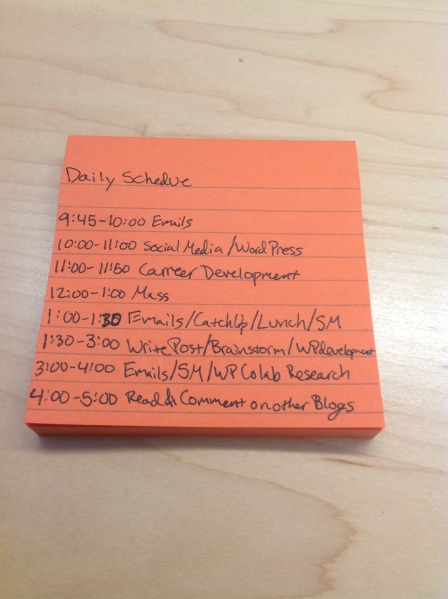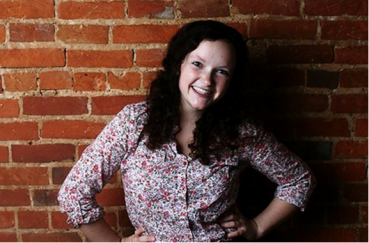Recently I watched the TED Talk “Your Elusive Creative Genius” by Elizabeth Gilbert, author of Eat, Pray, Love. Gilbert talks about a problem we, as a universal society, have accepted; the concept of the emotionally unsound artist. Too many creative minds are distraught with deep, negative and destroying thoughts. Gilbert points out that this acceptance and numbness to this reality is wrong. There doesn’t have to be an “emotional risk” for creative minds.
In her TED Talk speech, Gilbert talks about how creative minds can and should keep moving forward with their work after the passing of what might be their biggest and only success. I thought Millennials and young professionals could easily apply Gilbert’s teachings from the TED Talk to the threat of an identity crisis.v We may not all have the emotional risk of being a creative mind, but we all do have the emotional risk of succumbing to the pressures of being a twentysomething emerging into adulthood.
As a young professional there are many pressures in our lives – career, finances, self-improvement, and personal lives. We can be negative about our current job, apartment, bank account, or whatever our current situation might be. We worry about the future. Asking ourselves, “Will I ever be successful?” “Will I ever make something of myself?” These are similar dark thoughts to that o father creative mind Gilbert refers to.
After what Gilbert calls her “freakishly successful” book, Eat, Pray, Love, many people would come up to her and ask,
Aren’t you afraid you’re biggest success is behind you and you’ll never be as successful ever again?”
Gilbert admits this is a terrifying thought and a very possible one. Twentysomething young professionals have a similar thought wondering how they will find a job, advance in career, find a husband/wife, how they will be able to afford things like a house, etc. It is possible we may fail and not knowing is absolutely terrifying. That’s the reality.
To find a way to move forward in her career Gilbert knew she needed to create a “protective psychological construct” to create distance between work and anxiety. I believe twentysomething young professionals also need to create this construct between themselves and anxiety.
In Gilbert’s search for finding a way to create this construct she looked back at past societies to see if they had a better way to deal with the emotional risk of creative minds. This search lead her to Ancient Greece and Rome. At this time people didn’t believe creativity came from within a human, they believed it came from the “divine attendant spirits of creativity.” They believed it was an out of body source or creature that came “from a distant and unknowable source for distant and unknowable reasons.” The Greeks called this creature a “deity” and the Romans called them a “genius.”
When a performer had a moment where the genius would provide a glimpse of divinity through the performer the crowd would shout, “Allah! Allah!” “Allah” meaning God. Later, through the lost of pronunciation and culture, “Allah” became “Ole”. “Ole” is still something we shout today a sporting games when an athlete does something amazing or to support our favorite team. People used to understand where this talent, ability or creativity came from. The origin of the source was just lost over time. The Renaissance is where the idea of creativity coming from an inner source of the individual person came to be a new concept. Gilbert believes that is where we, as a society, went wrong.
If creativity does come from a genius and not somewhere within the individual then an immense amount of pressure is relieved. We also can’t be corrupted by pride if we cannot take credit for the talent(s). The good, or the bad, performance would be attributed to the genius. Everyone would understand that concept and accept it. The emotional risk would be taken away from the creative minds because they would not drown from the anxiety.
If we young professional can accept that there is an uncontrollable big picture we will be free from our pressures and anxiety as well. I personally believe my talents were given to me by God for a reason. I do not know the big picture, I cannot control what happens in my life, but I can use my talents to the best of their ability. For me, utilizing my talents and performing them to the best of their ability is my acceptance to the big plan and a thank you for receiving the talents. I accept i have no control or notion of what’s to come but i work as hard as i can with what I have. Whether you believe there is a genius, a gift from God or some other unknowable source, I believe acceptance is the key for young professionals to avoid their emotional risk and taking charge of their identity crisis.
After explaining the idea of having a genius, Gilbert goes on to explain different ways creative minds have dealt with this genius. Poet Ruth Stone told Gilbert about when she was younger and worked in the fields how she would literally feel the ground tremble beneath her. Every time Stone felt this tremble she knew it meant she needed to get to a piece of paper and pen fast. When the tremble caught up to her it felt like a windy storm was streaming through her. If she got to the paper and pen in time the poem would flow out through the pen and onto the paper. If she didn’t catch Stone said she felt the storm pass through her as it went off in search of another poet. During the moments when she almost lost the storm she would reach out with one hand as if to grab the storm by the tail and slowly pull it back in as the other hand wrote the words. Stone said that in these instances the poem would come out flawlessly, but completely backwards from the last word to the first.
Gilbert had a chance to interview musician Tom Waits for a magazine pieces years ago. Waits shared a story with Gilbert about one of his encounters with an outer body source. Waits said he would hear an enticing beautiful melody that would be his inspiration, his storm. One time he was driving down the freeway in LA when he heard this enticing melody. Waits anxiety started to creep up inside him again, worrying that he had no way to capture this melody and it would haunt him forever. Instead of allowing himself to be engulfed by his anxiety Waits looked up to the sky and said,
Excuse me, can you not see that I’m driving? Do I look like I can write down a song right now? If you really want to exist come back at a more opportune moment when I can take care of you, otherwise go bother somebody else today.”
Stone’s and Waits’ interactions with these out of body sources of inspiration helped change their work process for the better. They were able to release themselves from the emotional risk, the anxiety. They didn’t have to feel regret about missing moments to capture a poem or a melody. Gilbert said she herself was saved by this practice of interacting with the source. While writing Eat, Pray, Love she said she encountered one of these dark moments of anxiety and instead of succumbing to it, she took Waits’ approach. She spoke out loud towards a corner of the room about how if this book wasn’t a success it wasn’t entirely her fault. She showed up for her part of the job and she expressed how it would be great if the source or genius would show up for its part.
Millennials and twentysomething young professionals can change their work process and thought process by using these methods. I think the first step is to accept. Accept the reality that we do not have control and we do not know what the future holds. Then we each need to find an individualized way to deal with this reality any time anxiety and negative thoughts emerge. You can go with the talking out loud approach, or something different – praying, meditating or talking to a counselor.
Creative mind or not, be grateful for when your inspiration and your moment comes. When things finally align and you understand the big picture a little better, be grateful. Before, during and after your genius allows a glimpse of divinity to shine through you, show up to do you work. Show up every day and give it your all.
“Don’t be afraid. Don’t be daunted. Just do your job. Continue to show up for your piece of it whatever that might be. If your job is to dance, do your dance. If the divine cockeyed genius assigned to your case decides to let some sort of wonderment be glimpsed for just one moment through your effort then ole. And if not, do your dance anyhow and ole to you nonetheless. I believe this and I feel like I must teach it. Ole to you to you nonetheless just to have the sheer human love and stubbornness to keep showing up.” ~ Elizabeth Gilbert
How will you take charge of your genius to control your identity crisis?



